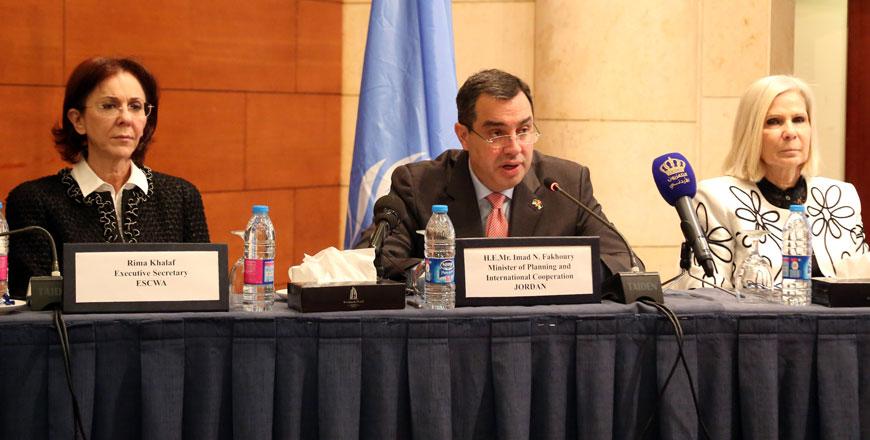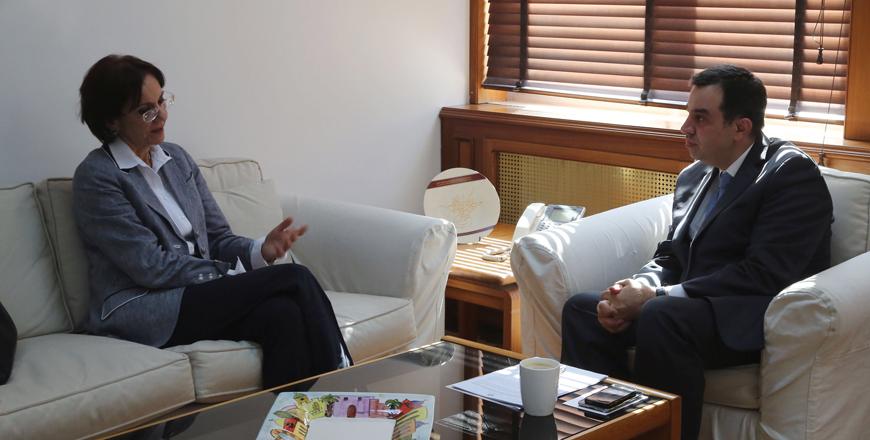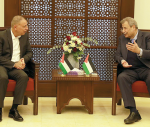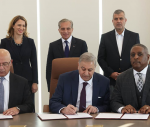You are here
'Kingdom keen on honouring commitments related to sustainable development, climate change'
By Merza Noghai - May 30,2016 - Last updated at May 30,2016

Outgoing planning and international cooperation minister Imad Fakhoury speaks at the 2016 Arab Forum for Sustainable Development in Amman on Sunday (Photo courtesy of Ministry of Planning and International Cooperation)
AMMAN — Sustainability is not simply a question of continuity; it is a transformation in today’s world, ensuring dignity for present generations and security for future generations, a UN official said Sunday.
Rima Khalaf, undersecretary general and executive secretary of the UN Economic and Social Commission for Western Asia (ESCWA), said that “transforming our world” is the aim of the 2030 Agenda for Sustainable Development that was developed in 2015.
"This aim has imposed itself on a world destroyed by war and conflict, consumed by poverty and need, and smothered by environmental degradation and climate change," Khalaf said at the inauguration of the 2016 Arab Forum for Sustainable Development (AFSD).
She also highlighted that these challenges must be overcome to ensure the continuity of life on this planet.
Development is the tool to successfully address these challenges, but this success is preconditioned on directing all mental, ethical, institutional, economic and human capacities towards that desired transformation, the ESCWA official noted.
AFSD is a high-level meeting intended as a primary regional platform to discuss cohesive and coordinated implementation and follow-up and review of the 2030 Agenda for Sustainable Development in the Arab region, according to www.unescwa.org.
The findings and recommendations, conveying key messages from the region, will be submitted to the High-Level Political Forum convened under the auspices of the UN Economic and Social Council, ensuring that Arab countries have a voice at the global level.
"Sustainability demands methods to cement peaceful political evolution, and tackle moral, social, national and institutional degradation," Khalaf told attendees, representing Arab parliaments, civil society institutions, the private sector and the media.
She added that ESCWA is committed to supporting partnerships for the development of countries and societies.
Haifa Abu Ghazaleh, the assistant secretary general and head of the media and communication sector at the Arab League, said that Resolution 631 — issued on March 2015 at the Arab summit held in Sharm El Shiekh — highlights the league's keenness on drawing up Arab plans for sustainable development.
"[Today's] meeting is aimed at exchanging views on how to implement the 2030 agenda..., especially [that] there are some huge challenges facing the region," she said, adding that these difficulties have pushed the Arab League to prepare a plan to enhance Arab countries' ability to face crises.
Implementing the agenda requires considering population mobility, forced migration and refugee influxes, said Abu Ghazaleh, calling on the international community to shoulder its responsibility in supporting host countries and maintaining their natural resources.
The two-day forum is organised by ESCWA in cooperation with the Arab League and the UN Environment Programme.
Outgoing planning and international cooperation minister Imad Fakhoury also spoke at the forum, highlighting the importance of the partnership between the public and private sectors and describing it as a "main factor in the success of the development process".
"Adopting the 2030 Sustainable Development Goals requires drawing up a roadmap to implement them based on the Arab strategic framework for sustainable development, and the national and regional challenges for each country," Fakhoury added.
As the Kingdom is keen on honouring its international commitments and out of a concern in issues related to sustainable development and climate change, the government in 2002 established the Higher National Committee of Sustainable Development, he added.
"Providing the necessary funds to achieve the 2030 agenda goals is a big challenge for the international community, and it is important for assistances to continue and even to increase to up to 1 per cent of the GDP of low- and middle-income countries by 2020," the minister stressed.
Related Articles
AMMAN — Planning and International Cooperation Minister Imad Fakhoury on Monday met with the UN Undersecretary General and Executive Secreta
UN officials and representatives of Arab League states, financing institutions and civil society convened on Wednesday with the purpose of adopting a unified Arab position on sustainable development.
AMMAN — Minister of Planning and International Cooperation Imad Fakhoury met earlier this week with Undersecretary General and Executive Sec














